
Understanding AI Sales: Key Concepts and Real-World Impact
GeneralKey Highlights:
- AI sales integrates artificial intelligence technologies into the selling process, enhancing efficiency and client interactions.
- Key applications include predictive analytics, lead scoring, and automated communication systems.
- AI sales reduces manual workload, allowing sales representatives to focus on high-impact tasks.
- By 2025, AI sales is expected to be a crucial strategic advantage for organisations, optimising processes and enhancing customer engagement.
- Salesforce’s Sales Analytics application exemplifies how AI can improve sales performance through real-time data analysis.
- A significant portion of the workforce lacks training in generative AI, with 70% of marketers reporting no training from employers.
- AI technology could generate an estimated $15.7 trillion in revenue by 2030, highlighting its economic potential.
- Key characteristics of AI sales include automation, data-driven insights, and personalization, which drive efficiency and effectiveness.
- Real-world applications demonstrate AI’s transformative potential, with companies reporting increased conversion rates and reduced operational expenses.
- Challenges in implementing AI sales include integration issues, a shortage of skilled personnel, budget constraints, and data privacy concerns.
- Effective implementation strategies should prioritise training, data quality, and ethical transparency to overcome these challenges.
Introduction
In the rapidly evolving landscape of sales, artificial intelligence (AI) emerges as a game-changer, fundamentally reshaping how organisations engage with customers and drive revenue. By integrating AI technologies into sales processes, businesses can streamline operations, enhance customer interactions, and unlock valuable insights from vast datasets.
From predictive analytics to automated communication systems, AI empowers sales teams to focus on strategic initiatives rather than mundane tasks. As companies navigate the complexities of modern consumer behaviour, it becomes essential to understand the core concepts, historical evolution, key characteristics, and real-world applications of AI in sales.
This exploration not only highlights the transformative potential of AI but also addresses the challenges organisations face in implementation, paving the way for a future where AI-driven sales solutions are integral to success.
Defining AI Sales: An Overview of Its Core Concepts
AI sales signifies the strategic integration of artificial intelligence technologies into the selling process, markedly enhancing efficiency, improving client interactions, and driving revenue growth. This integration encompasses applications such as predictive analytics, lead scoring, and automated communication systems. By leveraging AI sales, teams can scrutinise extensive datasets to uncover trends, customise client experiences, and enhance their selling strategies.
The impact of AI on revenue efficiency is profound; it reduces the manual workload for representatives, allowing them to focus on critical tasks that yield results. By 2025, the implementation of AI sales in commercial activities is recognised as a crucial strategic advantage, with numerous organisations harnessing these technologies to optimise processes and enhance customer engagement.
For instance, Salesforce’s Sales Analytics application exemplifies how AI sales can enhance sales performance. By delivering real-time data analysis, it empowers managers to monitor performance, adjust strategies, and close deals more effectively. This tool has proven to enhance revenue effectiveness, showcasing the tangible benefits of AI sales integration.
Current statistics reveal that a significant segment of the workforce remains untrained in generative AI, with 70% of marketers reporting that their employers do not yet offer such training. Nevertheless, expert insights suggest that AI technology could generate an astonishing $15.7 trillion in revenue by 2030, underscoring the potential economic impact of adopting AI in commerce. As companies navigate the complexities of modern client interaction, the incorporation of AI sales into transaction processes is not merely advantageous; it is essential for sustained growth and competitiveness.
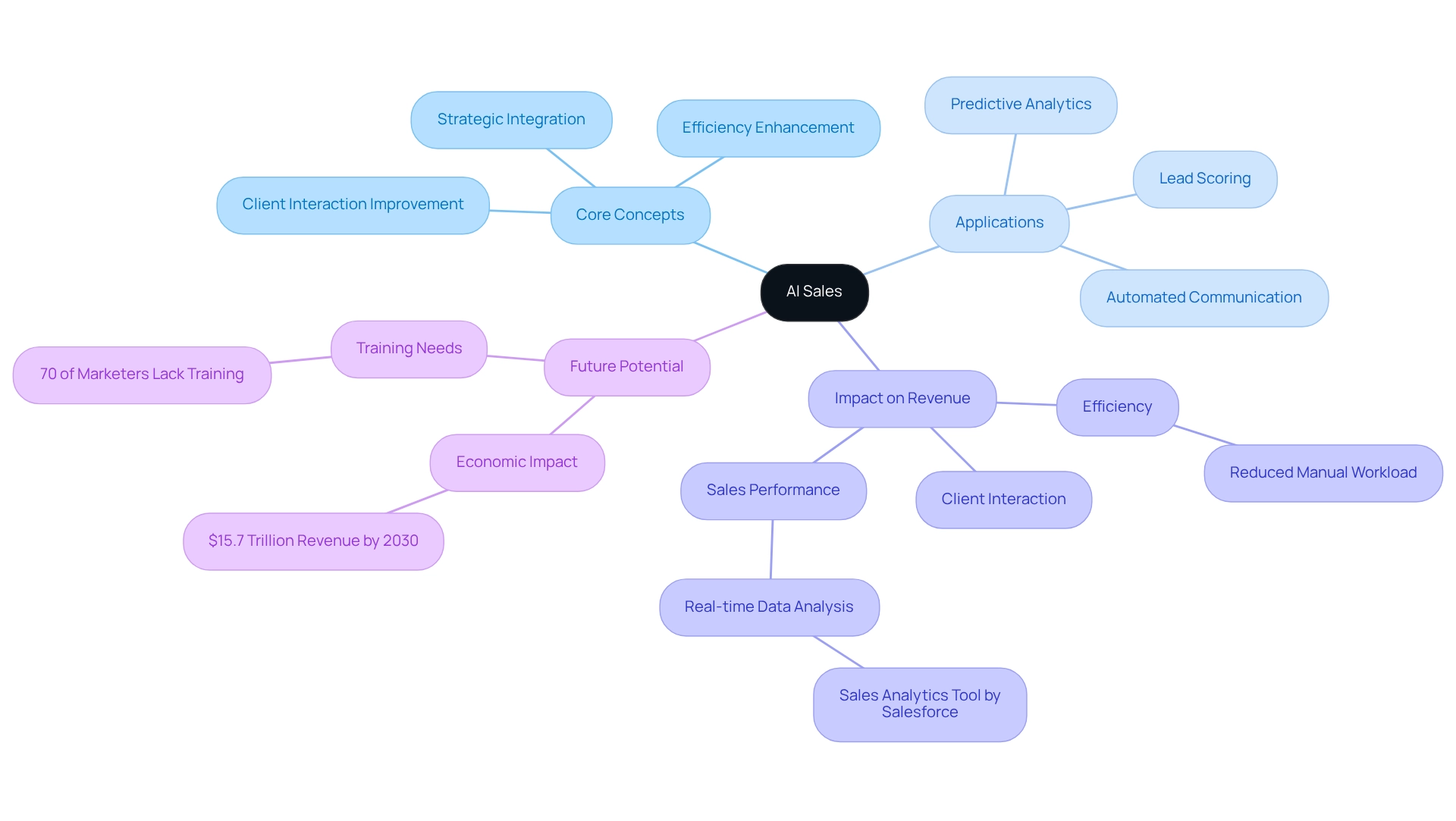
The Evolution of AI in Sales: Historical Context and Technological Advances
The development of AI sales in commerce began with the essential application of data analysis and client relationship management (CRM) systems. In the early stages, sales teams utilised basic data assessment tools to monitor client interactions, laying the groundwork for more sophisticated technologies. As machine learning and natural language processing advanced, AI began to revolutionise commercial processes. By the 2020s, AI sales tools had significantly evolved, facilitating the automation of routine tasks and enabling in-depth analysis of consumer behaviour and the generation of actionable insights. This transformation empowered teams to shift their focus from administrative duties to strategic decision-making, resulting in enhanced performance and increased client satisfaction.
Historically, the timeline of AI’s advancement in commerce from 2000 to 2025 illustrates a remarkable trajectory. Initial AI applications, such as predictive analytics software, gained traction in the early 2000s, providing insights for AI sales teams into buyer preferences and purchasing behaviours. As technology progressed, more sophisticated solutions emerged, including chatbots and virtual assistants that began to support customer interactions. Despite facing challenges—such as the low trust levels in chatbots, where only 7% of individuals relied on them for claims compared to 49% who trusted human advisors—these tools have continued to evolve.
The growth of AI sales in commercial technology has been marked by significant milestones, including the integration of AI-driven analytics into CRM systems, which enables organisations to leverage vast amounts of data for enhanced decision-making. By 2025, AI tools are expected to become even more advanced, further optimising transaction processes and improving client interactions. This historical evolution underscores the critical role that AI sales play in contemporary marketing strategies, empowering organisations to thrive in an increasingly competitive landscape. Notably, Agentics stands at the forefront of this evolution, providing customised voice AI solutions that enhance efficiency and customer engagement, thus transforming business communication.
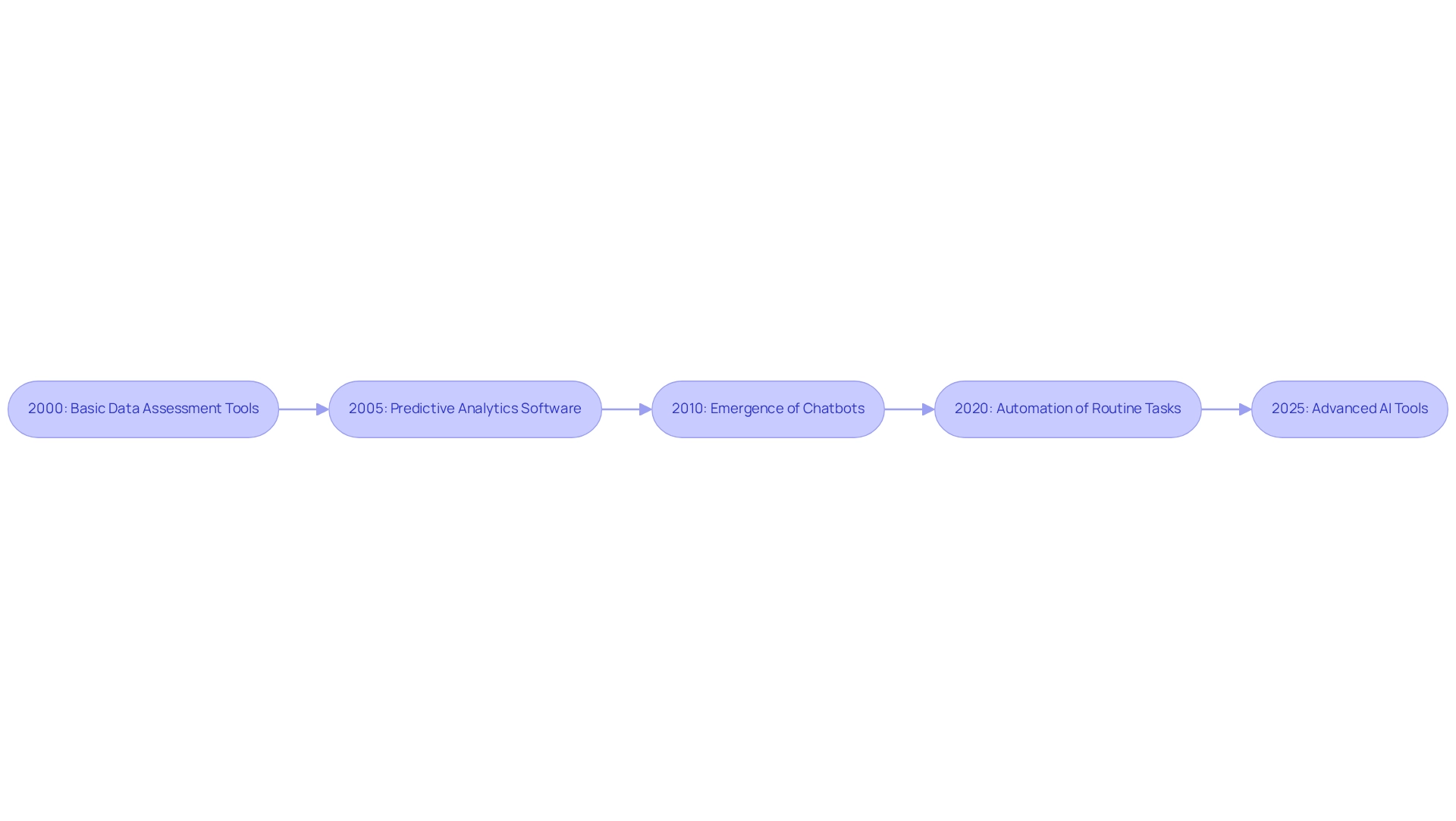
Key Characteristics of AI Sales: Enhancing Efficiency and Effectiveness
Key traits of AI sales—automation, data-driven insights, and personalisation—are instrumental in enhancing efficiency and effectiveness. Automation streamlines repetitive tasks such as data entry and follow-ups, allowing teams to focus on strategic initiatives that drive growth. For example, in the UK telecommunications sector, a remarkable 86% of businesses have embraced real-time analytics, leading to significantly faster product rollout times. This showcases the efficiency gains that automation can deliver.
Data-driven insights empower business professionals to make informed decisions using real-time analytics and AI sales, thereby improving forecasting accuracy and lead prioritisation. This approach is increasingly vital, as businesses come to understand that the pressing question is not whether to automate, but how swiftly they can adapt to remain competitive. Projections for 2025 indicate that organisations leveraging AI sales in their revenue strategies will experience substantial improvements in performance metrics.
Personalisation stands as another critical component of AI transactions. Advanced tools analyse client data to tailor interactions, enhancing the overall client experience. A prime example is Starbucks’ loyalty programme, which processes over 90 million transactions weekly and has successfully generated personalised offers, resulting in a revenue boost of over 25% since its inception. Collectively, these traits foster a more effective transaction system, ultimately driving higher conversion rates and nurturing client loyalty.
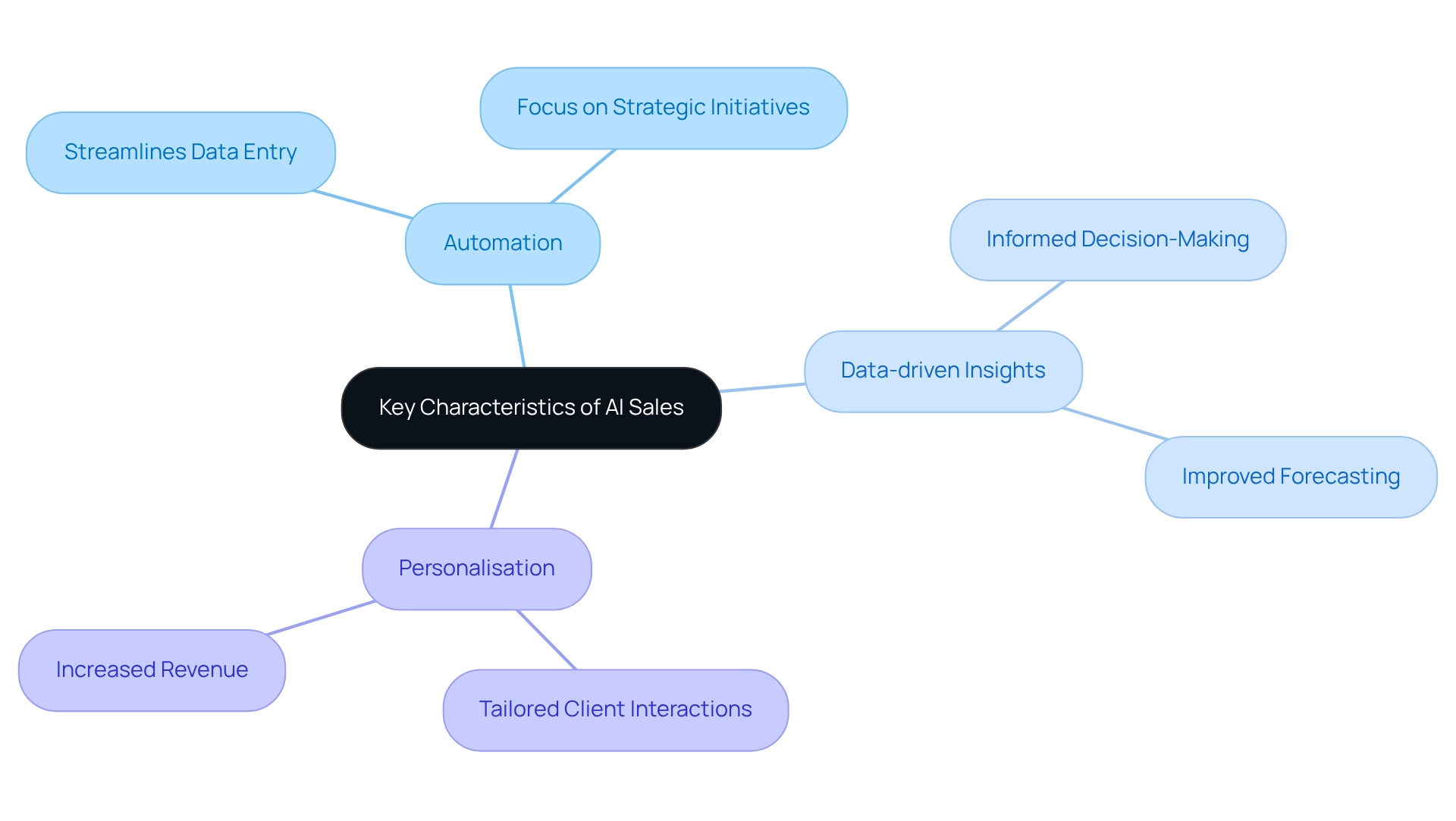
Real-World Applications of AI in Sales: Transformative Examples
Numerous companies have successfully integrated AI sales into their sales processes, demonstrating its transformative potential. A prominent e-commerce platform, for instance, employs AI-driven chatbots to manage inquiries, significantly reducing response times and enhancing customer satisfaction. Similarly, a B2B software company utilises predictive analytics to identify high-value leads, resulting in a remarkable 30% increase in conversion rates.
Furthermore, AI applications are being harnessed for personalised email marketing campaigns, where algorithms analyse customer behaviour to customise content, leading to increased engagement rates. These examples illustrate that AI is not merely a theoretical concept but a practical resource capable of driving significant business results. A leading mid-market SaaS company reported a 12% increase in win rates while simultaneously reducing operational expenses by 83%, showcasing the efficiency gains that AI can deliver.
As sales teams increasingly recognise the benefits of AI sales—98% of surveyed teams by Salesforce agree that it enhances lead prioritisation—the shift toward AI-driven solutions is set to continue. Automated lead qualification and prioritisation by AI sales agents further exemplify how these tools assist teams in effectively identifying and nurturing promising leads. Additionally, AI agents streamline the lead generation process by sifting through large datasets to pinpoint high-quality prospects, significantly boosting the effectiveness and efficiency of marketing campaigns.
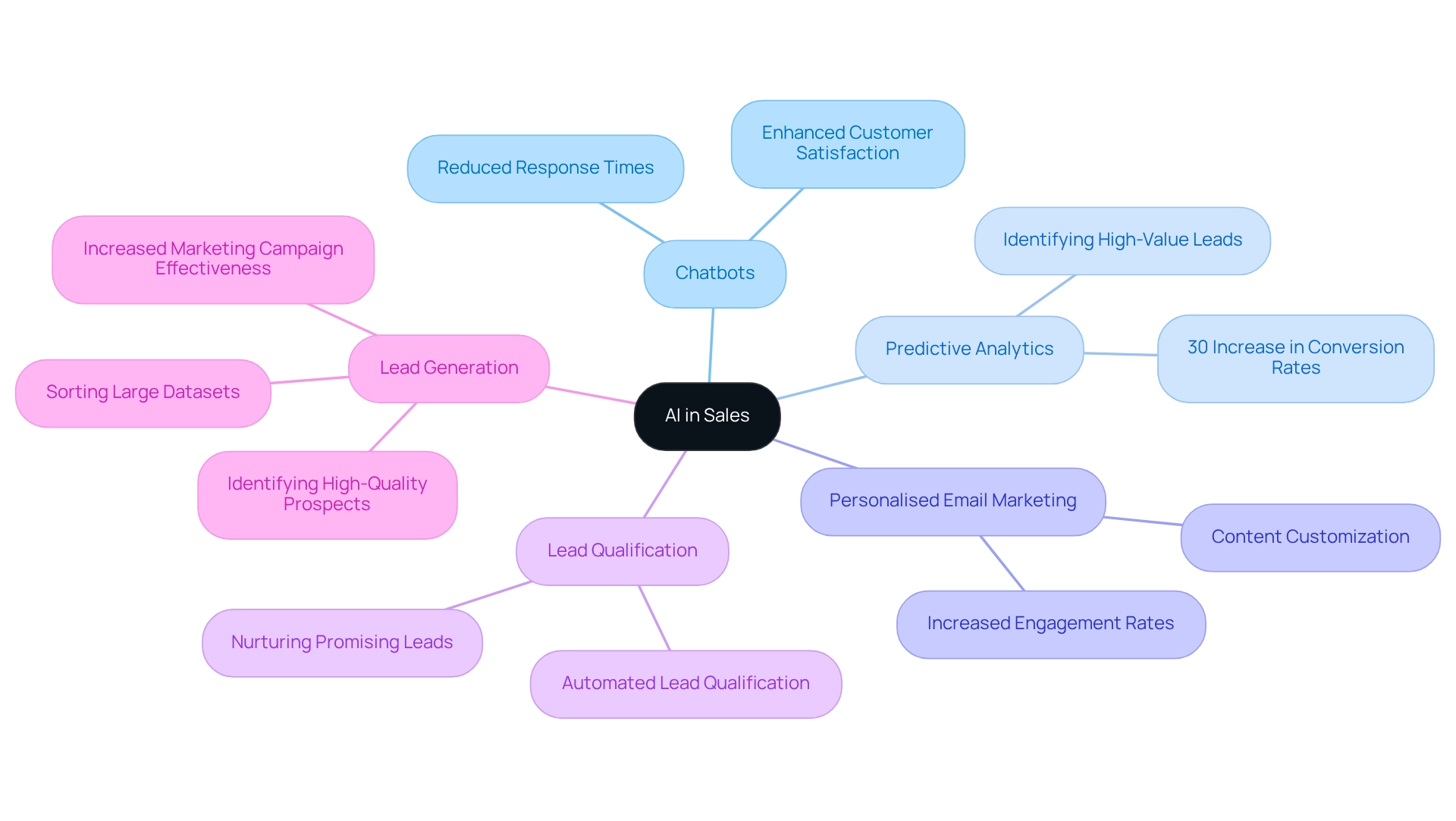
Challenges and Considerations in Implementing AI Sales Solutions
The integration of AI sales in commerce provides significant advantages; however, companies face various challenges that must be addressed for successful implementation. A primary obstacle is the integration of AI tools with existing transaction systems, often necessitating considerable time and resources. A survey involving 1,491 participants across 101 nations revealed that numerous organisations grapple with integration difficulties, with the most frequently cited concerns being:
- A shortage of skilled personnel
- Budget limitations
Furthermore, resistance from marketing teams accustomed to traditional methods can hinder the acceptance of new technologies, as employees may be reluctant to shift from established practises.
Data privacy and security concerns are critical, as businesses must ensure the responsible management of customer information. This issue is particularly pressing in an era where over 80 percent of organisations report not observing a tangible effect on their enterprise-level earnings before interest and taxes (EBIT) from generative AI utilisation, underscoring the necessity for effective implementation strategies.
To navigate these challenges, organisations should prioritise training and change management initiatives that cultivate a culture of innovation and continuous improvement. Case studies indicate that agencies focusing on:
- Data quality
- Human expertise
- Ethical transparency
are vital for successfully integrating AI into their business processes, enhancing overall performance and building client trust. By addressing these factors, businesses can better position themselves to harness AI sales’ full potential.
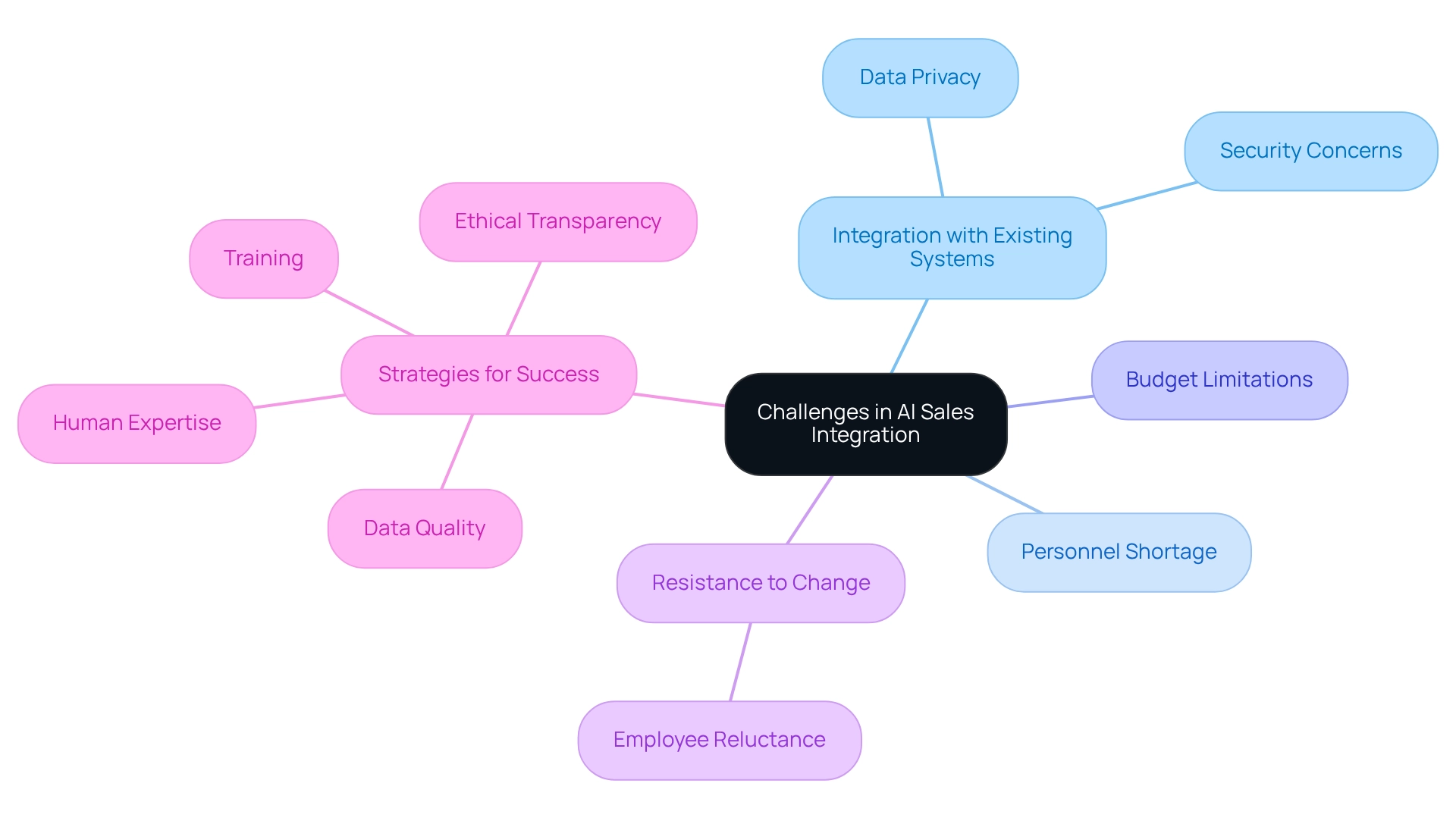
Conclusion
The integration of artificial intelligence into sales processes is fundamentally transforming customer engagement and driving revenue growth. By leveraging AI technologies like predictive analytics and automated communication, organisations can enhance efficiency and focus on strategic initiatives. This evolution allows sales teams to better understand customer behaviour and tailor their approaches accordingly.
Historically, AI in sales has progressed from basic data analytics to advanced tools that automate tasks and provide actionable insights. This progression enables companies to gain a competitive edge, as real-world examples demonstrate significant improvements in conversion rates and customer satisfaction through AI adoption.
However, implementing AI in sales presents challenges, including integration issues, data privacy concerns, and resistance from teams accustomed to traditional methods. To overcome these hurdles and fully realise the benefits of AI-driven solutions, organisations must prioritise training and foster a culture of innovation.
In conclusion, embracing AI in sales is essential for organisations seeking to thrive in a rapidly evolving marketplace. The future of sales is intertwined with artificial intelligence, making it crucial for businesses to adapt and innovate to achieve sustained growth and success.
Frequently Asked Questions
What is AI sales?
AI sales refers to the strategic integration of artificial intelligence technologies into the selling process, which enhances efficiency, improves client interactions, and drives revenue growth through applications like predictive analytics, lead scoring, and automated communication systems.
How does AI sales improve revenue efficiency?
AI sales reduces the manual workload for sales representatives, allowing them to concentrate on critical tasks that yield results, thus enhancing overall revenue efficiency.
What are some examples of AI sales tools?
An example of an AI sales tool is Salesforce’s Sales Analytics application, which provides real-time data analysis to help managers monitor performance, adjust strategies, and close deals more effectively.
What is the potential economic impact of AI in commerce by 2030?
AI technology could generate an estimated $15.7 trillion in revenue by 2030, highlighting its significant potential economic impact on commerce.
What historical developments have led to the evolution of AI in sales?
The evolution of AI in sales began with basic data analysis and CRM systems, progressing through advancements in machine learning and natural language processing, which allowed for the automation of routine tasks and in-depth analysis of consumer behaviour.
How has the trust in AI tools like chatbots evolved?
Trust in AI tools like chatbots has been low, with only 7% of individuals relying on them for claims, compared to 49% who trusted human advisors. However, these tools continue to evolve and improve.
What role does Agentics play in the evolution of AI sales?
Agentics provides customised voice AI solutions that enhance efficiency and customer engagement, playing a significant role in transforming business communication within the AI sales landscape.
What percentage of marketers report a lack of training in generative AI?
Currently, 70% of marketers report that their employers do not offer training in generative AI, indicating a significant gap in skills within the workforce.
Enjoyed this post? Share it with your network!
10 Best AI Sales Tools to Boost Your Team’s Performance

Discover the top 10 best AI sales tools to enhance team performance and drive revenue growth.
Mastering Test Call Numbers: A Step-by-Step Guide for Sales Directors

Elevate your communication with our guide on mastering test call numbers for sales success.
7 Ways Automated Outbound Calls Boost Sales Performance

Discover how automated outbound calls enhance sales performance and streamline communication.
